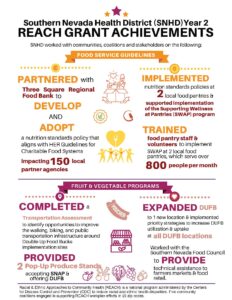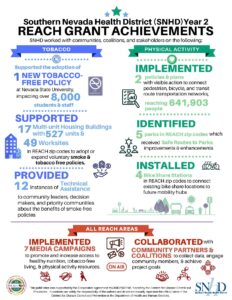The Nevada Minority Health and Equity Coalition (NMHEC), located in the University of Nevada, Las Vegas (UNLV) School of Public Health, is made up of a diverse set of community leaders and members who are committed to improving the health outcomes of our most disenfranchised and vulnerable populations through capacity building, advocacy, and research. NMHEC believes that a community-based participatory approach to health is one of the most effective ways to collectively and collaboratively address the root causes of health inequities. As such, the coalition engages and welcomes community partners and leaders from across sectors to help identify priority areas, inform solutions, and pool resources to move the needle towards better health. NMHEC grew from a handful of committed organizations and individuals with an informal membership structure, to a formal partnership structure representing academic, civic, private, and community organizations serving Nevada’s diverse populations. For more information visit: https://nmhec.org
Strategic Priorities
Capacity Building
Capacity building is necessary for building long-term impact. It enhances partnerships’ collective ability to address health disparities by strengthening skills and knowledge and providing resources that enhance community engagement. This coalition aims to support capacity building in areas of policy, advocacy, community-based participatory research, and grant development.
Policy and Advocacy
Giving a voice to our most vulnerable is essential to what we do. The NMHEC is committed to work alongside cross-sectoral partners to highlight community concerns and advance policies and practices that address social determinants of health.
Research, Data, and Dissemination
Research is essential to developing evidence-based interventions that can improve population health outcomes. In collaboration with research institutions, the NMHEC is committed to:
- Identifying and contributing to interdisciplinary research needs that address the intersection between social determinants and health
- Collecting, analyzing, and disseminating data that better informs the needs of Nevadans
REACH
REACH (Racial and Ethnic Approaches to Community Health) is a national program led by the Centers for Disease Control and Prevention (CDC) that improves health, prevents chronic diseases, and reduces health disparities among racial and ethnic populations most affected by chronic conditions.
In 2023, the Southern Nevada Health District (SNHD) received a five-year REACH grant to continue its Community Partnership to Promote Health Equity project. This effort focuses on reducing chronic disease risk factors related to nutrition guidelines, access to healthy foods, physical activity, and tobacco use across 18 zip codes in Clark County, Nevada. Beginning in October 2025, tobacco use will no longer be part of the project’s focus. SNHD works with community partners, coalitions, and stakeholders to carry out strategies that support healthier environments and advance health equity.
 |
 |
| REACH Grant Achievements Year 2 | |


